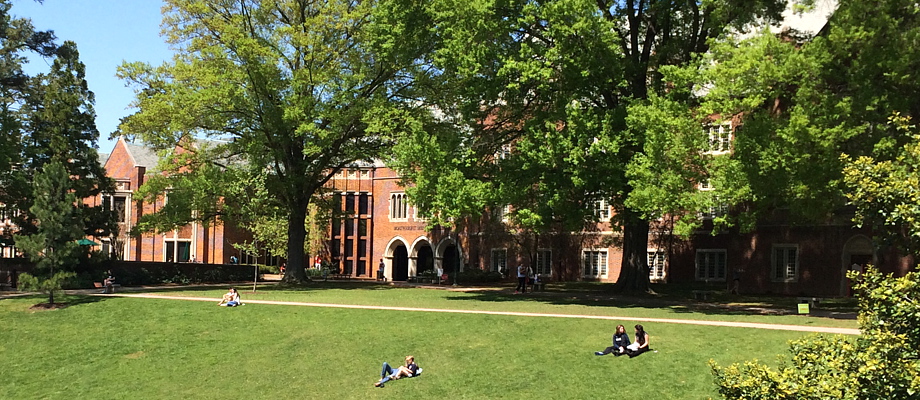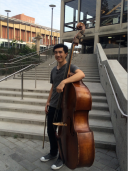
WASHINGTON D.C. INTERNSHIPS DISTINGUISH AMERICAN UNIVERSITY'S GAP PROGRAM
https://admissions.blog/washington-d-c-internship-distinguishes-gap-program-at-american-university/
Not all college-bound students begin their journey into higher education a few months after high school graduation. Some may be eager for a new, non-classroom experience, or want to explore the working world before settling in for years of study. Others may not have planned to take time off, but were admitted to their top-choice college not for the upcoming fall, but for the following spring; and want to spend their break, or gap semester, productively.
One distinctive possibility for any student interested in a productive gap experience is American University’s School of Professional and Extended Studies Gap Program in Washington, D.C., also known as AU Gap. Leveraging the resources and relationships of its unique location, AU Gap Program offers high school graduates an internship experience in the capital city for one or two semesters, as desired, with up to seven credits per semester.
“One semester can be a great option for students spending part of the year overseas,” says Terrell Austin, AU’s GAP Program Advisor. “It can also be ideal for students admitted to college for spring term.”
Alternatively, students who want to spend the full academic year with AU’s Program can either intern at two distinct sites, or continue with their first semester site. “Most students who choose to stay a second semester — about 20 percent of participants — choose a different internship experience,” says Austin, “just to try another field and gain some different experience and insight.”
AU’s deep and growing database of more than 3000 potential internship sites, actively managed by Amy Morrill Bijeau, Director of Experiential Education, offers job experiences in a student’s career field interest — including business, communications, international affairs, journalism, justice, politics, psychology, and the arts and sciences.
It is important to note that students are not placed into an internship; instead, just like in the real world, they must secure their position themselves, with guidance and support from the AU Gap team, who work closely with the student to get them prepared. “We focus,” says Austin, “on giving students professional development right from the start.”
The process requires some introspection and self-knowledge. “Students first need to articulate who they are and what type of job experience they are looking for,” says Austin. They also get help with their resumes and cover letters, as well as interview preparation and assistance with navigating the internship database.
Once students have selected 10-15 potential sites from the database, they begin the job-hunting process — sending out their resumes, making contacts, scheduling interviews. “In almost all cases,” says Austin, “students find their internship position within two weeks.”
Students work at their job site three days a week, mentored by their site coordinator, and earn up to four college credits. In a few cases, they may also be paid. “It happens occasionally,” says Austin, “as an unexpected bonus.”
Gap Program students also participate in an interactive weekly seminar led by an AU professor, with graded assignments and class presentations; prominent guest speakers; and field visits that could only be possible in D.C. — to embassies, congressional hearings, the Supreme Court, government agencies, non-profit organizations, conferences on a topic they have been studying, and more.
Besides enhancing the internship experience by helping students build communication skills, develop their network, and gain insight on world issues, the three-credit seminar keeps study skills fresh. It is also an exclusive offering that participants share only with their fellow interns (approximately 10-20 students).
“We think it’s important to foster a cohort experience for the AU Gap Program students,” says Austin, “where they are getting encouragement from each other and can also talk out any challenges they may be facing.”
To further facilitate the cohort relationship, AU Gap students live in the same residential hall (among full-time AU students), making it easier to build social relationships. As with all AU students, they have a meal plan, metro pass, and access to all campus facilities. Expenses are estimated at $18,000 per semester.
Who is a good candidate for AU Gap? “High-achievers looking for a real-world work experience before college,” says Austin. Students also need to be enthusiastic about the program, because although there is a lot of support, it requires a lot of initiative, too.
The application is rolling, so students may apply any time during their senior year of high school. A 3.0 GPA is required (exceptions may be made in unusual circumstances), as well as two letters of recommendation, two essays, and a phone interview Austin conducts with both the student and parents.
One further point for any student considering a gap experience with college credit: if you will be applying to college later, you may be regarded as a transfer student at some colleges (rather than as an incoming freshman), depending upon the number of credits you have earned, so it would be wise to inquire about this ahead of time at the specific institutions you are targeting. If you have already been admitted and either plan to ask for a deferral or are starting in the spring, make sure to receive permission for your specific gap program to avoid jeopardizing the original admission decision.
Restrictions for Out-of-State Students Seeking Resident Tuition
https://admissions.blog/university-of-california-restrictions-for-out-of-state-students-seeking-resident-tuition/
The nine University of California campuses, featuring top programs in sunny locales, attract many out-of-state students. UCLA, for example, processed 113,761 applications last fall — the highest in the nation – with 22,822 from out-of-state.
Those numbers make admission very competitive, but out-of-state students can take heart: they are admitted at a higher rate (22% of out-of state applicants to UCLA were admitted in 2018, versus 12% of in-state), because fewer will ultimately enroll (24% of admitted out-of-state students to UCLA enrolled, versus 50% of in-state). The nonresident tuition, however, can sting – it’s an additional $28,992 per year.
Hoping to offset this, nonresidents frequently explore possible routes to resident tuition. In truth, there are many restrictions for out-of-state students seeking to qualify. (more)
Those numbers make admission very competitive, but out-of-state students can take heart: they are admitted at a higher rate (22% of out-of state applicants to UCLA were admitted in 2018, versus 12% of in-state), because fewer will ultimately enroll (24% of admitted out-of-state students to UCLA enrolled, versus 50% of in-state). The nonresident tuition, however, can sting – it’s an additional $28,992 per year.
Hoping to offset this, nonresidents frequently explore possible routes to resident tuition. In truth, there are many restrictions for out-of-state students seeking to qualify.
“Obtaining California residency for the purposes of tuition and fees is extremely difficult for undergraduates with nonresident parents (this includes transfer students from community colleges and other postsecondary institutions within California).
Virtually all nonresident undergraduates with nonresident parents remain nonresidents for the duration of their undergraduate career at UC.”
Still, many out-of-state students will continue their quest to qualify. The following provides some guidance for their typical questions.
Can I qualify for residency if I get a California driver’s license and register to vote, and/or my parents buy property in California?
No.
“Residence can be established only by the union of physical presence and intent. Physical presence alone is insufficient; intent alone is insufficient.”
This means that to establish residency, the student and family must relocate to California (physical presence), and establish legal ties in California while severing ties to their former place of residence (intent).
Furthermore, you must be continuously physically present in California for more than one year (366 days) immediately prior to the term start date. Also note that any reclassification of residency is not retroactive.
Aren’t there any exceptions?
Yes.
The list of exceptions, however, is very specific, such as:
- a nonresident student who is the dependent of a California resident parent
- a student member of the U.S. Armed Forces on active duty in California
- an amateur student athlete training at a U.S. Olympic Training Center in California
What if I am financially independent and I move to California and work there for 366 days before starting school — will I qualify?
Maybe.
In addition to establishing residency in California for 366 days prior to the start of the term, a self-supporting student must also “be able to verify financial independence for the two full years immediately preceding the term” they plan to enroll.
“This requirement makes it extremely difficult for most undergraduates who are not financially dependent on a California-resident parent to qualify for classification as a California resident.”
My neighbor’s son attends a California State University and he doesn’t pay out-of-state tuition. How can I do that at a UC?
The circumstances may be different, so you will need more information.
“Residency for purposes of UC tuition is specific to the University of California and separate from the California Community Colleges and California State University systems and may be different from residency for purposes of UC admission and other state rules or regulations governing residency for other purposes.”
My aunt lives in California. Can I just use her address to show that I am a resident?
No.
If a student conceals facts or makes untruthful statements regarding their residency, they are subject to penalty of perjury.
“A student must sign the Statement of Legal Residence even if the Student has yet to reach the age of majority; pursuant to State of California law, a Minor may be prosecuted for perjury.”
What about the Nonresident Supplemental Tuition (NRST) exempt classification — how can I qualify?
You may qualify if you meet specific criteria, such as:
- you attended a California high school, adult school, or community college for at least three years, and meet additional requirements (see Appendix D: AB 540 Requirements)
- you are the dependent of a California resident on active duty elsewhere, or a nonresident on active duty in California (see Appendix B: Veteran — Military Provisions).
Who is the right person to contact for accurate information?
“Inquiries regarding UC residency for purposes of tuition should be directed to a campus Residence Deputy in the campus Registrar’s Office or to a Residency Analyst in the Office of the General Counsel of The Regents of the University of California, Office of the President.”
The information provided above is applicable only to nonresident U.S. citizens; and is not comprehensive or all-inclusive. Find out more about residency requirements on the UC website at the Board of Regents Policy 3105 on Residency and Payment or Waiver of Tuition, Non-Resident Supplemental Tuition and Mandatory Systemwide Fees; the UC Residence Policy and Guidelines 2019/2020; and Understanding Residency.
All About UC Berkeley's Management, Entrepreneurship,
& Technology (M.E.T.) Dual Degree
In the past, aspiring entrepreneurs with interests in both engineering and business gained their expertise "in a silo," says Chris Dito, Executive Director of the M.E.T. program at the University of California, Berkeley. (more)
University of California Application:
10 Requirements Out-of-State Students Don't Expect
Are you California dreaming? Do you want to spend your undergraduate years on a University of California (UC) campus? The news is good — in spite of growing protests in recent years from many Californians (who believe resident students are being squeezed out) the percentage of out-of-state (and international) freshmen across all UC campuses is at an all-time high. (more)
University of California: 10 Rules About the Arts Requirements
Applicants to the University of California (UC) must complete fifteen college-prep courses for admission to any UC campus. One of those courses must be from Visual and Performing Arts (VPA). The VPA requirement can be confusing to out-of-state students, because many high schools do not require completion of an arts course to graduate (more)
Demonstrated Interest: Ten Ways to Connect With Colleges
Colleges want to admit students who will accept their offer of admission. Doing so increases their yield (the percentage of admitted students who enroll). A high yield is not just a marker of popularity for the college and a way to boost its rankings; it also strengthens a college’s ability to shape its freshmen class, because a greater number of admitted students can be counted on to attend. (more)
30 Summer STEM Camps for High School Freshmen
Summer is a good time for high school students to explore their interests. A little research and planning can uncover ways to investigate an idea, acquire a new skill, or demonstrate a specialty with independent research or projects. In the fields of STEM, especially, there are many options available, including residential summer camps.
The problem for current high school freshmen (rising sophomores), however, is that many of these camps restrict attendance to their older classmates: rising juniors and seniors. (more)
Note to Parents: Do Not Write Your Student's
Is it difficult for college admission officers to tell when a student has not written his own application essay? No, it often isn’t difficult at all. Admission officers read thousands of college essays, year after year. (more)
Three Times You'll Be Glad You Didn't Blow Off College Visits
“I’ll visit the campus if I’m admitted. Visiting takes too much time; besides, I’ll probably just go to the top school that admits me.” For students who have the means to travel, but who plan to give more weight to rankings than personal fit in their final college choice, skipping exploratory college visits might represent a reasoned admissions strategy. (more)
How and Why ZeeMee Updated Your
2017-18 College Admission Video
Think of the ZeeMee digital video as a live resume for your college application. It’s an opportunity to introduce yourself, show your personality and share your story, as well as make a more personal connection with your application reader. (more)
Don't Be Perfect and Other Tips
for Your ZeeMee College Admissions Video
During the college admissions process, sharing your story as part of your application provides context and gives you the opportunity to introduce yourself. In the past, this has been accomplished by submitting at least one essay with your college application and at some schools, scheduling a personal interview. Today’s Snapchat Generation can also submit a concise video specifically geared to the college admissions process via digital video manager ZeeMee. (more)
Ten Tips to Elevate Your Extracurricular Activities
If you are a high school student keeping up your grades and keeping busy with some activities you enjoy, while also spending time with family and friends, congratulate yourself! You are obviously managing your time well as you work towards your goals. Having said that, many students decide they want to do more. Specifically, they hope to differentiate themselves on their college applications with an outstanding extracurricular resume. (more)
New NCAA Website Helps High School Athletes Explore
Eligibility for College Play Earlier
When the NCAA updated its Eligibility Center website in November, the goal was to make it “a lot easier for students to navigate,” says Gretchen Morin, Coordinator of Eligibility Center Communications. (more)




